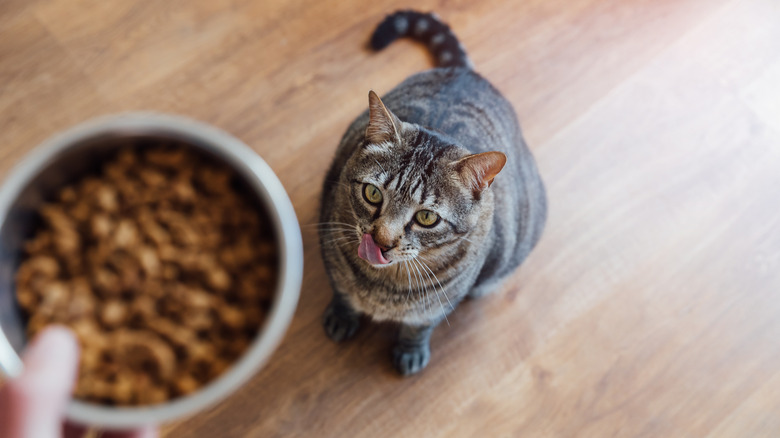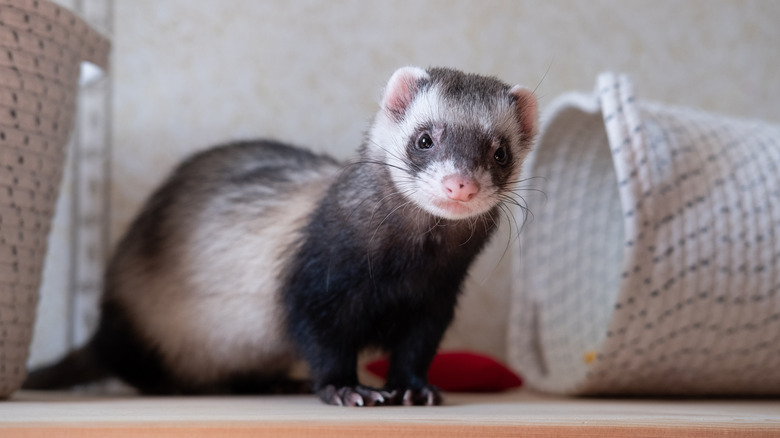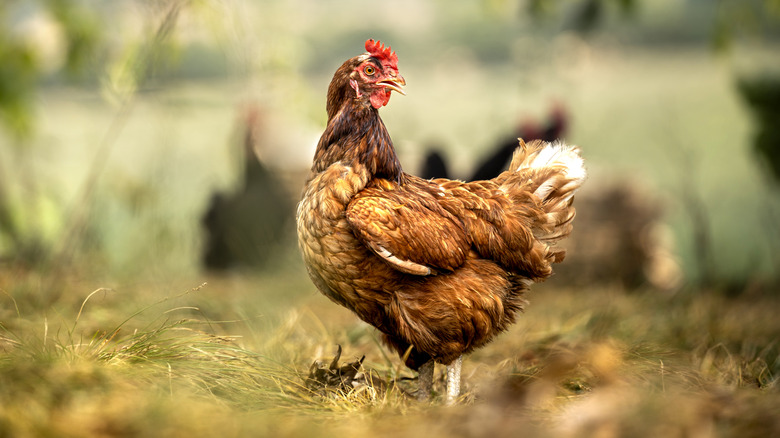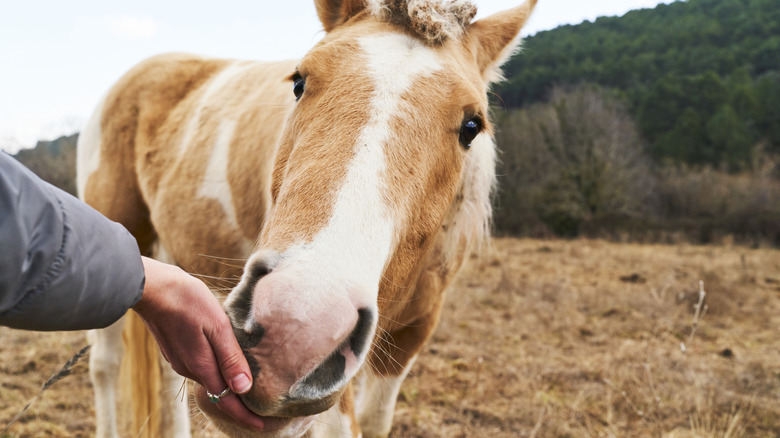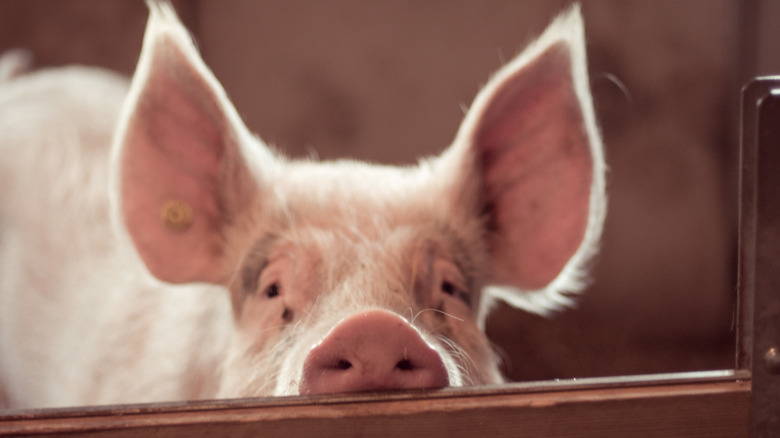Chocolate Isn't Toxic To Dogs Only — Keep It Away From These Pets Too
There are many human foods our pets shouldn't eat. Chocolate is the most well-known and usually tops the list of foods dogs can't eat. However, you may not know that other pets can become ill when eating chocolate, too. According to a 2013 study carried out by the Veterinary Institute of Massey University in New Zealand, many pets are susceptible to the effects of chocolate, including horses, pigs, and chickens. In addition, cats and ferrets can suffer the same toxicity symptoms.
The reason chocolate can be so deadly to pets is two chemicals within it: theobromine and caffeine. Theobromine is found in high concentrations in cacao seeds. Both it and caffeine are easily absorbed by pets' gastrointestinal tract. However, unlike humans, pets break down these chemicals slower, leading to the symptoms of toxicity as the levels rise. In addition, sugar-free chocolates can contain a third toxic substance: xylitol. While not every type of pet is affected, some, like ferrets, can experience toxicity when ingesting it, too.
An emergency vet visit is one of the most common hidden costs of caring for a pet, and, according to West Virginia ER veterinarian Lindsay Vega, chocolate ingestion is one of the most commonly seen reasons for an emergency vet visit (via Dakota 283). The darker the chocolate, the more toxic it is, as well. White chocolate, while it doesn't contain the toxic theobromine found in milk and dark chocolate, is still not healthy to give your pets, either.
Cats
Chocolate is one of many foods you may regret giving your cat due to its toxic nature. Just like dogs, they're susceptible to the theobromine and caffeine found in it. Compared to small dogs of the same weight, it takes a smaller amount of theobromine ingestion to cause a reaction in cats. All that is needed is about 90 mg. of theobromine per pound to cause toxicity symptoms. For comparison, a Hershey's Milk Chocolate Bar contains 64 mg. of theobromine.
Typically, chocolate toxicity symptoms appear about two to four hours after eating a toxic amount. These symptoms include vomiting and diarrhea, as well as sudden excessive thirst and urination. In addition, cats may show signs of pain by panting, have an abnormal heart rhythm, or even experiencing seizures. If you spot these symptoms or notice your cat has eaten some chocolate, it's best to seek emergency care right away for treatment.
Ferrets
Ferrets react very similarly to their canine and feline companions when it comes to chocolate toxicity. However, due to their small size, a much smaller amount of chocolate can be enough to cause them serious harm. Veterinarian Gary Brummett states that just 2 ounces of milk chocolate or 0.1 ounces of baking chocolate can be fatal for your furry friend (via Tipp City Veterinary Hospital). Like dogs, sugar-free chocolates also pose a danger to ferrets, as xylitol can cause similar toxicity symptoms when ingested.
Ferrets experience similar symptoms of toxicity as other pets, including vomiting and diarrhea. In addition, they can experience dehydration, sudden hyperactivity, and tremors. Other symptoms of chocolate toxicity in ferrets include an abnormal heart rhythm, an increase in body temperature, and a spike in blood pressure. Since such a small amount of chocolate can cause severe illness, it's important to seek veterinary care immediately if you notice any symptoms or your ferret has gotten into even just a bite of chocolate.
Chickens
Chickens are great at turning food scraps into delicious eggs and will happily dig in compost heaps and scrap piles looking for a tasty treat. However, you may want to avoid adding chocolate to their food pile. Theobromine can cause similar toxicity symptoms in chickens as it can their four-legged friends. These include vomiting, diarrhea, seizures, and, in extreme cases, death. In chickens, 40 grams of chocolate may be enough to cause problems — that's only 1.5 ounces.
However, ingested chocolate isn't the only potential cause of cocoa toxicity in chickens. Cacao bean shells are a common component of the mulch used in gardens, as well as in some coop bedding. As chickens enjoy scratching around in their bedding and around the yard, they may come into contact with or accidentally ingest enough to cause problems. It's best to keep any mulches using these ingredients out of the chicken coop, yard, and anywhere your flock may frequent. If you do notice symptoms, contacting your avian veterinarian is best.
Horses
While you may not think to give your horse a piece of chocolate intentionally, the effects of eating chocolate can still be a problem for our equine pals. Like cats and dogs, theobromine is the main culprit that can cause issues in horses. It's hard for horses to metabolize chocolate as quickly as humans, so if a lot of chocolate is given to them over a long period, it can lead to health issues like heart complications and nervous system dysfunction.
In addition, the high amount of caffeine as well as the high sugar content of most candy bars isn't healthy or good for horses to eat. If you're looking for a sweet treat to give your horse, try giving it a slice of watermelon or a banana instead. Like chickens, cacao bean shells found in mulch and bedding can also pose a potential problem in horses. They may accidentally ingest some of the mulch or bedding if hay is dropped into it. It's best to keep these products out of paddocks, fields, and stalls that your horse frequents to stay safe.
Pigs
There's some controversy over whether chocolate is truly toxic to pigs. One side recommends avoiding feeding any chocolate to pigs for the same reasons as cats and dogs, stating that theobromine leads to health issues and even death in pigs. However, conflicting information on the other side argues that pigs have a similar gastrointestinal tract to humans, and thus can break down chocolate safely as a result. Regardless, both sides still say it's not the best idea to feed chocolate to pigs when there are many healthier foods to offer instead. As with horses and chickens, it's also a good idea to avoid mulches and bedding that contain cacao bean shells, just to be safe.
Overall, chocolate toxicity can be a scary, emergency situation for many of our pets. It's always best to seek veterinary care immediately if any of your animals have ingested chocolate. Your vet can work with you on a treatment plan of inducing vomiting, offering meds, and administering fluids to ensure your pet recovers fully.

